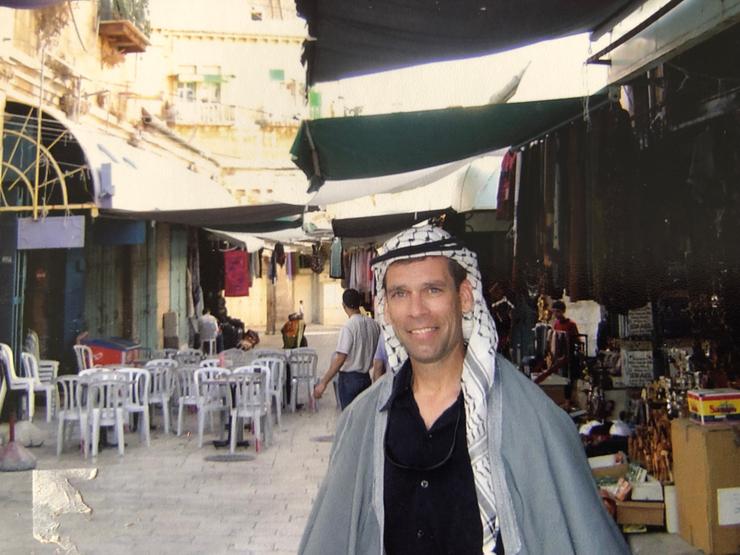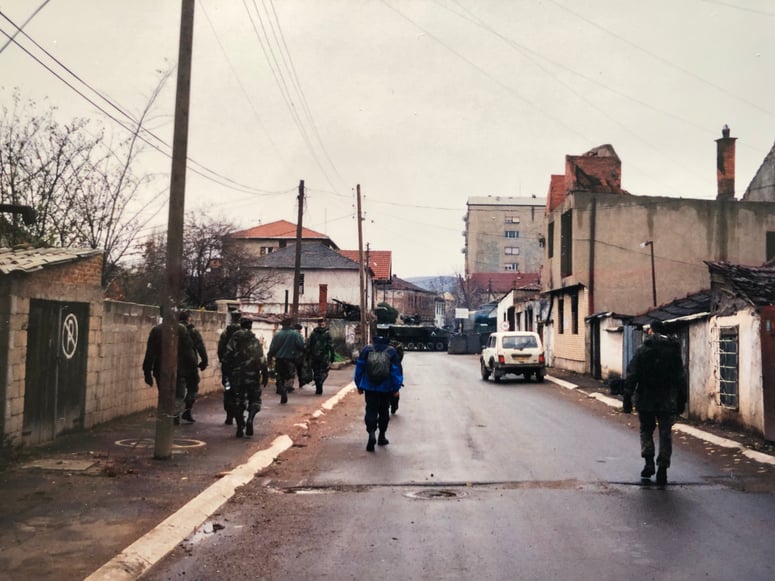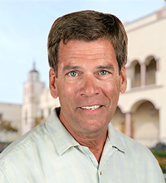What the U.S. Military and a School Dedicated to Peace Can Learn Together

Bob Mackay in Jerusalem with Isreali Defense Force, March 2007
begin quo
The mission of our nation’s military is to provide forces needed to deter war and ensure our nation’s security. Since 1775 our military has successfully accomplished that mission and has preserved the peace during inter-war periods. As a former soldier, I prepared for war most of my life, while doing my best to preserve the peace back home in several different ways. I am proud to have contributed to those enduring missions.
Now, I am an Adjunct Research Staff Member with the Institute for Defense Analyses supporting our government’s Security Governance Initiative with selected Africa partner nations. I facilitate recurring policy and strategy workshops aimed to develop their security and defense governance while I study theories and methods of conflict resolution and management at one of the only schools exclusively dedicated to the study of peace in the United States.
What a fascinating and intellectually challenging opportunity it is! I wish I had the opportunity during my active duty career to learn the theories and methodologies for preventing violent conflict that I learned so far at the Kroc School. At this point, using my new knowledge, I hope I can better assist my African partners while continuing to share my new insights with the other subject matter experts on my team!
From Warfighting to Peacebuilding: A Shift in Training and Education
Soldiers, sailors, marines and airmen in our military are trained and educated at the tactical, operational and strategic levels of war throughout their careers at a series of military institutions across our country dedicated to warfighting such as the Army, Navy and Air War Colleges. They have the best and most experienced warfighting instructors, challenging curriculum and incredible infrastructure, but in the past have notably lacked a cadre of experienced peace instructors. For decades, these institutions looked at peace as being the necessary outcome of war and have not included peace topics in the curriculum.
That collective mindset has changed following the end of the Cold War with the great increase in smaller conflicts and challenges around the world — and our military’s inability to address all of them effectively. The military learned in recent history that it cannot claim victory in these smaller conflicts without the application of other instruments of national power which are focused on creating or preserving peace through diplomatic, information and economic means. These instruments are now taught and applied in detail at our military institutions to complement the military instrument.
At this point in our nation’s history, you will find a civilian peace expert or two at each of our nation’s military institutions. They are typically senior diplomats from the Department of State or academics educated in peace studies. As peace is what soldiers wish and pray for, so they do not have to go to war, you would think it appropriate that they also learn the theories and methods behind preserving peace and preventing war.
Perhaps here at the Kroc School, we could evaluate and institute a similar approach and recruit active duty military officers to attend the range of master’s programs focused on peace and possibly offer them opportunities to teach.
New Kinds of Missions Require New Kinds of Learning
Military missions are so diverse these days. They include such varied tasks as defending our homeland, supporting our civil authorities, countering terrorism, stabilizing situations in other countries, and a relatively new task labeled “security cooperation.” Security cooperation is aimed at building close relationships, creating partner nation capabilities or enhancing their capacities in several areas. The bottom line is making friends — those friends don’t attack us or our other friends.
The military now also finds itself as a leading United States Government humanitarian assistance provider with a healthy annual appropriation from Congress. Our military assists our partner nations around the world by enhancing their disaster preparedness and response capacities, addressing basic medical and health requirements, and providing rudimentary infrastructure construction which addresses basic human needs.

Mackay's Orientation Visit to Kosovska Mitrovica, Kosovo, October 2001
The experience gained from these kinds of peacebuilding missions is one reason why soldiers have so much to offer at the Kroc School. Through their service, they have likely experienced a diverse set of peacebuilding-related skills that include mediating difficult discussions between warring local factions, facilitating talks about reintegrating former combatants into society with community leaders, protecting a refugee camp, negotiating cessation of hostilities in a town halfway around the world, and providing much needed humanitarian assistance to a community affected by war. All of that experience provides an invaluable perspective which, speaking personally, has enabled me and my peers to get even more from our courses.
In my case, I developed these peacebuilding related skills through what we call “on-the-job training” or OJT. While valuable, that’s not the only way of learning. I’d like to posit that if active duty military leaders and decision makers enrolled in Kroc School courses, that education would help shape the range of options they consider for how to prevent and resolve conflicts and could lead to better outcomes.
At the Kroc School, Soldiers Expand Their Definition of Peacebuilding
As a student at the Kroc School, I quickly realized that there is more conflict in the world than just at the national and international levels. My professors and classmates, who come from all over the world, have introduced me to the devastating effects of human trafficking, gender inequality issues, root causes of homelessness in the San Diego area, and much more. I‘ve learned about the importance of non-governmental and volunteer humanitarian organizations, immigration and asylum challenges for people wanting to become Americans, and human rights. Our challenging practical exercises and interesting presentations have increased my awareness of the pain and suffering among individuals occurring locally, and also how local issues can have national and international implications.
When I was contemplating going back to school to study conflict resolution, my daughter — who was pursuing her master’s degree in Education from our next door neighbor at the School of Leadership and Education Studies (SOLES) — let me know about the Kroc School and its curriculum. She and my family encouraged me to take the leap. I checked it out, quickly realized you can be a student at any age, and the rest is history.
In the time I’ve spent here, the Kroc School has educated me about conflict theories and resolution methods which I can apply to my current duties as the policy and strategy representative on my Africa institution building team. Some of these theories and methods have helped me understand why warring factions in Africa have difficulty resolving differences with the respective governments and vice versa. Although I don’t have a seat at the negotiating table where I work in Africa, I can now provide some methods to assist our partners who do.

Mackay Hosting Malian Senior Officials to In-N-Out Burger in Monterey, California, January 2018
Additionally, I have gained a tremendous appreciation for the shared experiences, knowledge and ambition of my younger classmates and their deep desire to make changes in our community and the world, whether their focus is on reducing homelessness and human trafficking, improving race relations, addressing immigration policies, or addressing gender equality challenges.
While I personally tend to focus on international conflict issues in my current work, I have learned the importance of what my classmates bring to the table as subject matter experts in their own fields. I am amazed so many people have devoted their lives to making our world better, and I thank the Kroc School for allowing me to share in this experience.
The previous post was contributed by Master of Science in Conflict Management and Resolution student Bob Mackay.

Bob Mackay is a retired Army officer and civil servant who currently assists African nations with building security governance. During his career, Bob worked U.S. Army, Joint, Interagency and Multinational assignments at the tactical through strategic levels in the United States, Asia and Europe. His assignments included tours with U.S. Army units, U.S. Navy commands, Military Education Institutions, Geographic Combatant Commands, the North Atlantic Treaty Organization, the European Union and the U.S. Department of State. As a civil servant, Bob led the Department of Defense Humanitarian Assistance Program for North America for 10 years. To complement his practical work in Africa, Bob enjoys learning conflict management and resolution theories and methodologies and sharing knowledge and experiences with his classmates in the Kroc School’s Conflict Management and Resolution Program. He graduated from the United States Military Academy and holds a master’s degree from the University of Southern California.
Contact:
Kevin Dobyns
kdobyns@sandiego.edu
(619) 260-7618

About the Author
The Joan B. Kroc School of Peace Studies (Kroc School) at the University of San Diego is the global hub for peacebuilding and social innovation. Founded in 2007, the Kroc School equips the next generation of innovative changemakers to shape more peaceful and just societies. We offer master's degrees in peace and justice, social innovation, humanitarian action, conflict management and resolution, and a dual degree in peace and law — programs that have attracted diverse and dynamic students from more than 50 countries. In addition to our graduate programs, the Kroc School is home to the Kroc Institute for Peace and Justice (Kroc IPJ). Founded in 2001, the Institute supports positive change beyond the classroom. Through groundbreaking research, experiential learning, and forward-thinking programs, the Kroc School and Kroc IPJ are shaping a future in which peaceful co-existence is the new normal.





